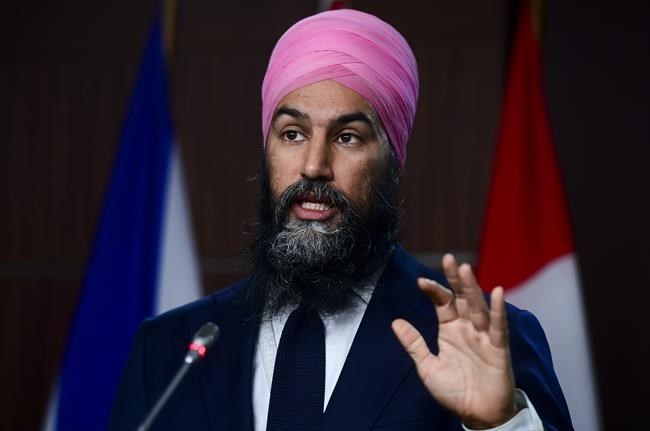OTTAWA — Jagmeet Singh is being squeezed.
Crowded on one side by spend-happy Liberals, on another by socially conscious Greens and, most recently, by Conservatives homing in on working-class voters, the NDP leader has his elbows up to hold ground for the traditional party of labour.
At first glance, that ground may seem shaky. It sits within a minority Parliament where Singh was cornered into propping up the Liberal government in an October confidence vote tied to the WE Charity affair. And it’s overshadowed by Prime Minister Justin Trudeau, who routinely steals the spotlight as lead player in the COVID-19 drama.
But as tight as his situation looks, Singh can point to bright spots on the orange horizon.
The NDP is poised to pay off its $10-million campaign debt from the 2019 election before January, he told The Canadian Press in a year-end interview.
And battles to bolster government aid for Canadians hit hardest by the pandemic mark selling points Singh can point to when pitching voters.
“I came down to the wire in negotiations (with the Liberals), saying we will not support specific legislation or a specific motion … unless you guarantee to continue CERB,” he said, referring to the Canada Emergency Response Benefit, the $500-a-week income support rolled out amid historic job losses last spring.
Singh has also claimed credit for boosting the federal wage subsidy to 75 per cent from a planned 10 per cent in March, and for ensuring paid sick leave made it into the fiscal update last month.
He also doesn’t appear perturbed about Conservative Leader Erin O’Toole’s push to appeal to working-class Canadians.
“What have they actually done?” Singh asked, noting that Tories said the CERB discouraged Canadian workers from weaning off federal aid.
“They cannot say that working-class people are demonstrably better off because of them. They can't.”
For his part, O'Toole has said a $1,200 payment next year for parents with kids under six — included in the fall economic update — was in his leadership campaign platform.
With the Liberals ditching fiscal anchors, ballooning the deficit to a projected $382 billion, and unveiling an ambitious carbon-pricing plan, the Conservatives might have more policy wiggle room as they make their case to trade workers and suburban parents.
“There are a lot more blue-orange switchers than people may assume from the get-go. Not everybody moves on the ideological scale in a linear pattern,” said Karl Bélanger, president of consulting firm Traxxion Strategies and former senior adviser to the NDP.
O’Toole’s efforts in this area mirror U.K. Conservative Prime Minister Boris Johnson's successful bid to lure voters away from the Labour party in 2019. It also bears some resemblance to the populist Reform party’s traction with disappointed NDP voters in the 1993 federal election in Canada.
“It’s worked in the past, and the NDP cannot just ignore it,” Bélanger said.
“The Conservative party in 2019 did its best ever among manual working-class voters,” said Peter Graefe, associate professor of political science at McMaster University.
“It does place Mr. Singh in a very difficult trade-off.”
Singh, 41, has continued to call for a tax on the “ultra-rich,” criticize how wage subsidies found their way into shareholder bank accounts and chip away at the Liberals for sluggish progress on national pharmacare and child-care programs.
He has also made a renewed push for voters under 35, advocating for cancelled interest payments on federal student loans, now part of the government’s fiscal update. He also joined popular progressive U.S. congresswoman Alexandria Ocasio-Cortez in a livestreamed video-game session and has been busting out his dance moves on social media platform TikTok. (One Fleetwood Mac-themed post garnered 3.7 million views.)
One area of the country where New Democrats have fallen farthest from their 103-seat high of 2011 is Quebec, where they now once again represent just one riding, a long way down from the 59 seats in the province they won in Jack Layton's last election.
Singh has repeatedly called out systemic racism, and faced it himself before and during his time in politics, while Quebec Premier François Legault has rejected the notion outright.
The issue came to a head in June, when Bloc Québécois Leader Yves-François Blanchet demanded Singh apologize after he called a Bloc MP racist for blocking an NDP motion on RCMP discrimination. Singh was removed from the House of Commons over it.
Singh is upbeat about his prospects in Quebec.
“There is a very vibrant culture of progressive politics in Quebec, where people care deeply about justice and care about social programs, and care about things like systemic racism,” Singh said, pointing to young Quebecers in particular.
Whether a federal election is in the cards next spring is a pundit’s parlour game. But Singh’s position going in looks steady, if not assured.
“Presumably he’s still there a bit on a probationary basis, with the next election probably being pretty telling about whether he can hope to be a Broadbent or a Layton in terms of lasting through four elections or five elections, or whether he’ll be more of an Alexa McDonough,” Graefe said, invoking past NDP leaders.
Until then, the turf war continues.
This report by The Canadian Press was first published Dec. 19, 2020.
Christopher Reynolds, The Canadian Press




